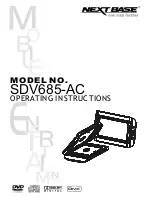
5
TROUBLESHOOTING
If your DVD player does not seem to be functioning properly, check the items below before you contact an authorized service
center.
Symptom Check
Power does not turn on or
suddenly turns off.
y
Make sure the adapter is securely plugged in.
y
Turn the power off and then back on.
Battery pack is in place but the
power does not turn on or
suddenly turns off.
y
Check that the battery pack is charged. If not, recharge it.
Remote control won't work
y
Check that the battery is inserted in the "+" and "-" direction properly.
y
The battery may be flat. Replace it with a new one.
y
Check that the signal transmission is directed at the remote control sensor on the DVD
player.
y
Remove the obstacle between the remote controller and remote control sensor.
No picture or sound
y
Check that the A/V cables are securely connected.
y
Check that the disc is a DVD, DVD-RW or AUDIO CD.
y
Do not use a disc that has scratches or dirt.
y
Check that the label-side of the disc is facing up.
y
The pick-up lens of the DVD player may be dirty. Contact the service center for lens
cleaning.
y
Check that the TV channel is set to VIDEO or AV if viewing with a TV.
No picture
y
Check that the LCD display is turned on.
No sound
y
Check that the display panel is open. If it is closed, audio will not be output to the
speakers.
y
Check the volume setting. If set to zero, turn up volume level.
y
Check that the headphones are plugged into the PHONES socket. Speakers cannot be
used with the headphones.
No picture and sound
y
Check that the battery is properly installed and the Adapter is properly connected.
Distorted video or sound
y
Use a disc without scratches or dents.
IMPORTANT SAFETY INSTRUCTIONS
y
The apparatus shall not be exposed to dripping or splashing and that no objects filled with liquids, such as vases, shall be
placed on the apparatus.
y
When the AC/DC adapter is used as the disconnect device, the disconnect device shall remain readily operable. To be
completely disconnected the power input, the AC/DC adapter shall be disconnected from the mains completely.
y
No naked flame sources, such as lighted candles, should be placed on the apparatus.
y
Minimum distances 2.0cm around the apparatus for sufficient ventilation. The ventilation should not be impeded by covering the
ventilation openings with items, such as newspapers, table-cloths, curtains, etc.
y
The use of apparatus is in tropical and/or moderate climates.
y
Attention should be drawn to the environmental aspects of battery disposal.
y
CAUTION: Danger of explosion if battery is incorrectly replaced. Replace only with the same or equivalent type.
y
Battery shall not be exposed to excessive heat such as sunshine, fire or the like.
y
Excessive sound pressure from earphones and headphones can cause hearing loss.
y
The marking plate is located at the bottom of the apparatus.
Electric and electronic equipment and included batteries contains materials, components and substances that
can be hazardous to your health and the environment, if the waste material (discarded electric and electronic
equipment and batteries) is not handled correctly.
Electric and electronic equipment and batteries is marked with the crossed out trash can symbol, seen below.
This symbol signifies that electric and electronic equipment and batteries should not be disposed of with other
household waste, but should be disposed of separately.
As the end user it is important that you submit your used batteries to the appropriate and designated facility. In
this manner you make sure that the batteries are recycled in accordance with legislature and will not harm the
environment.
All cities have established collection points, where electric and electronic equipment and batteries can either be
submitted free of charge at recycling stations and other collection sites, or be collected from the households.
Additional information is available at the technical department of your city.
























